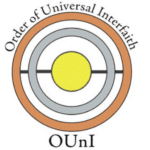Order of Universal Interfaith Declaration of Faith
ARTICLE I
All life is the creation of Divine processes that may or may not be understood, but and which require respect and compassion. We hold sacred the human responsibility to be kind and ethical stewards of all life, the planet and its resources.
ARTICLE II
Every human being has a unique interpretation of Divine processes and an individual relationship with the Divine. Even members of specific religions and denominations within religions have different shades of interpretation on some theological issues and conduct. No two humans should be considered exactly alike in their beliefs. Also, every spiritual community that comes together has its own identity and requirements for spiritual expression that honors the hearts and needs of its congregational membership.
ARTICLE III
We believe in the freedom of individuals and groups to practice the spiritual path(s) and/or religion(s) of their choice and that they should be free from religious beliefs or practices being forced upon them.
We believe that all spiritual paths and religions are valid ways to honor and serve the sacred. We honor all traditions to the degree that they maintain dignity and compassion for all others,
do not injure others, and do not infringe upon the spiritual and religious practices of individuals or groups.
ARTICLE IV
We affirm the value of spiritual and religious ritual that includes multiple religions together as a sign of solidarity with adherents of all faiths and to honor the wisdom and value of all spiritual paths and religious traditions. We believe that there are other spiritual teachings and practices, both old and new, of great worth, that are not tied to specific faith traditions.
ARTICLE V
All organizations that are members of the Order are inclusive of individuals from diverse spiritual-religious backgrounds and are inclusive of individuals with diverse racial, cultural and ethnic backgrounds, sexual orientations, and gender identities and expressions. This inclusiveness applies to all congregational leaders and individual members of the organizations.
ARTICLE VI
During the course of their ministry, all ordained ministers of the Order shall strive to transcend beyond their own personal belief system by seeking to understand, support, and serve the recipient based on the recipient’s spiritual needs and interpretations.
